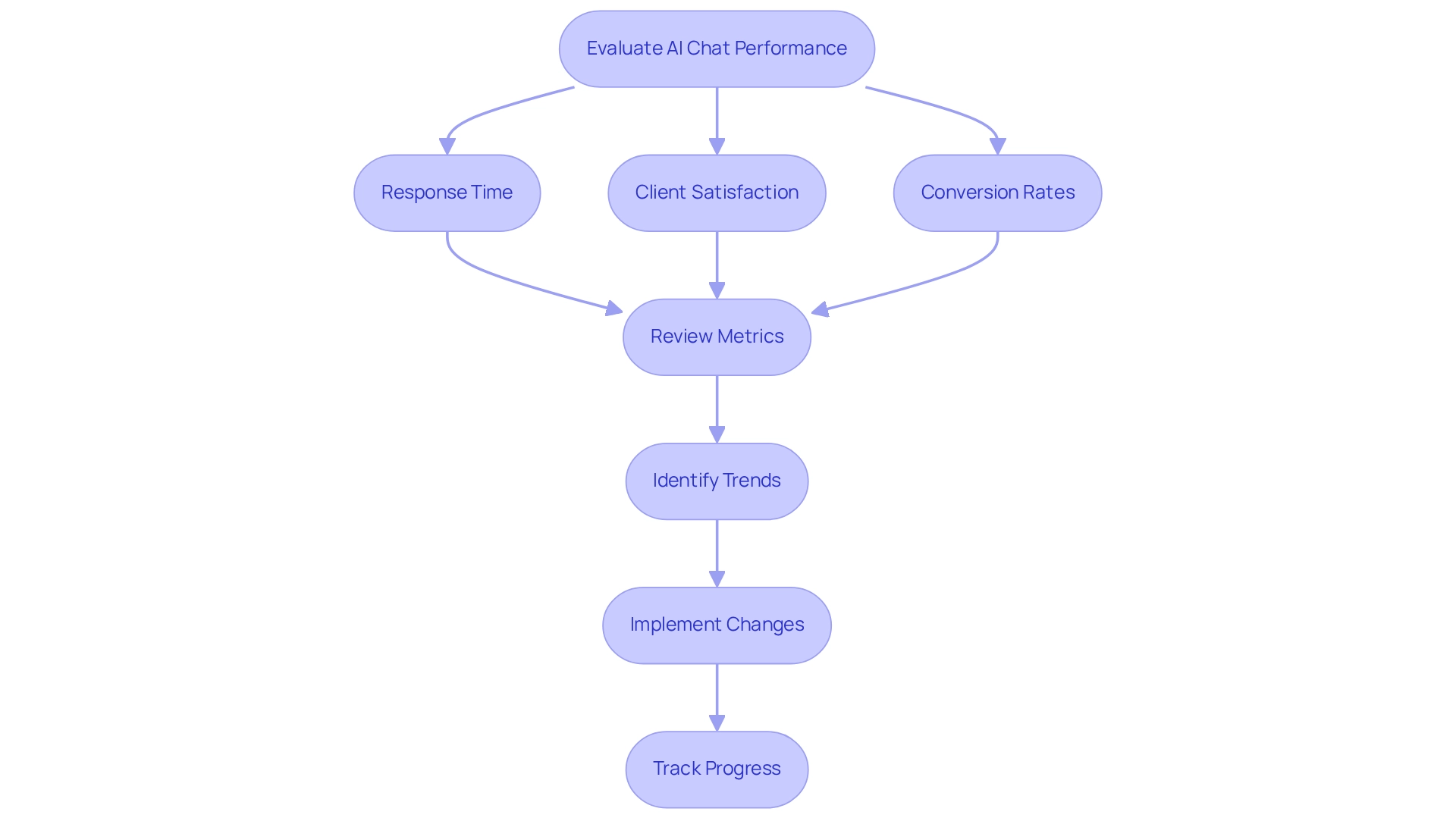
4 Ways to Use Online AI Chat for Sales Success
Voice AI InnovationsKey Highlights:
- AI chat tools automate interactions, providing real-time assistance to sales personnel and clients.
- 57% of businesses report significant ROI from AI chat, with 67% noting revenue increases from chatbot interactions.
- AI bots are projected to manage 95% of customer service engagements by 2025, making their integration essential for competitiveness.
- Personalised interactions through AI can enhance customer engagement and increase conversion rates.
- Integrating AI chat with CRM systems allows for more effective lead management and customer support.
- Training sales personnel on AI tools is crucial for maximising client interactions and improving performance.
- Key performance indicators (KPIs) such as response time and client satisfaction are vital for assessing AI chat effectiveness.
- Regular evaluation and optimization of AI chat performance can lead to better customer experiences and outcomes.
Introduction
In the rapidly evolving landscape of sales, the integration of AI chat technology has emerged as a transformative force for businesses aiming to enhance customer engagement and drive revenue growth. By automating interactions and providing real-time support, AI chat not only streamlines communication but also personalises the customer experience, paving the way for more effective sales strategies.
Organisations are increasingly recognising the substantial return on investment from AI chat solutions. Therefore, understanding how to implement and optimise these tools becomes paramount. This article delves into the multifaceted role of AI chat in sales, exploring its benefits, effective deployment strategies, and critical metrics for evaluating performance.
Ultimately, it guides businesses toward maximising their potential in a competitive market.
Understand the Role of AI Chat in Sales
Online AI chat tools are pivotal in modern marketing strategies, automating interactions and providing real-time assistance to both sales personnel and clients. This technology empowers companies to engage with potential clients instantly, addressing inquiries and guiding them through the purchasing journey. By leveraging natural language processing and machine learning, AI conversations can accurately interpret customer intent, tailor responses, and streamline transactions. Such advancements not only enhance operational efficiency but also allow representatives to engage in online AI chat, enabling them to focus on high-value tasks and ultimately propelling revenue growth.
Remarkably, 57% of businesses recognise the substantial return on investment facilitated by online AI chat. For instance, organisations that have integrated AI messaging solutions report a significant reduction in response times and an increase in lead conversion rates, underscoring the effectiveness of this strategy in achieving revenue success. Furthermore, 67% of business executives have noted a revenue increase linked to chatbot interactions, with 35% crediting these tools for securing contracts.
With projections indicating that AI bots will manage 95% of customer service engagements by 2025, incorporating online AI chat into sales tactics is not merely beneficial but essential for maintaining competitiveness in the marketplace. As Adam Evans, SVP Product at Salesforce AI Platform, articulates, “By embracing an agent-first approach, every business can redefine their operations and stay ahead – right now.” Additionally, the banking sector is expected to achieve over 90% success in bot engagements, exemplifying the efficacy of AI communication in specific industries.
Nevertheless, businesses must remain vigilant about common pitfalls in implementing AI communication solutions to fully harness their potential.
Leverage AI Chat for Enhanced Customer Engagement
To enhance client engagement, enterprises must adopt AI messaging solutions that prioritise tailored interactions. Leveraging data analytics is essential for understanding customer preferences and behaviours. For instance, AI messaging can initiate conversations based on user activity on a website, providing personalised product recommendations or addressing specific inquiries.
Furthermore, integrating AI chat with CRM systems facilitates a seamless exchange of information, empowering teams to pursue leads more effectively. Companies like H&M exemplify this strategy, having successfully implemented AI chatbots to assist clients with product inquiries, resulting in increased engagement rates and elevated sales.
By focusing on personalisation and prompt responses, businesses can cultivate a more engaging client experience that significantly enhances conversions. As AI technology continues to evolve, it is projected that AI bots will account for 95% of all client service engagements by 2025, underscoring the necessity for businesses to adapt to this trend.
Additionally, while 59% of consumers feel that AI has diminished the ‘human touch’ in service, effective personalisation can bridge this gap, ensuring that interactions remain meaningful and impactful. Addressing data privacy and security concerns is also crucial; by establishing clear policies and robust security protocols, businesses can build trust with clients and guarantee secure interactions with AI systems.
Implement AI Chat Solutions Effectively
To implement AI communication solutions effectively, businesses must establish clear objectives that outline their goals with the technology. This process involves identifying key use cases such as lead qualification, client support, or sales assistance. Choosing an AI messaging platform that aligns with these goals is essential; high-performing organisations are 2.1 times more likely to utilise AI bots compared to their underperforming counterparts. With AI bots projected to drive 95% of all client support engagements by 2025, the importance of implementing these solutions cannot be overstated.
Investing in thorough training for sales personnel is crucial to ensure they can leverage AI communication tools to enhance client interactions. Consistent oversight and enhancement of AI interaction performance are necessary to adapt to changing client needs and improve response precision. For instance, examining conversation records can help identify frequent client inquiries, enabling organisations to refine the AI’s responses and optimise the sales process. As noted by Kateryna Cherniak, ‘It is anticipated that AI bots will drive all client support engagements by 2025.’
Furthermore, with 81% of customer service departments planning to invest more in live communication support in 2024 and beyond, the commitment to enhancing customer interaction channels is clear, leading to improved service outcomes and higher satisfaction rates. However, businesses must also recognise common pitfalls in implementing AI communication solutions, such as inadequate training or failure to define objectives clearly. By addressing these challenges, organisations can maximise the benefits of AI communication technology.
Evaluate Performance and Optimize AI Chat Usage
To effectively assess online AI chat solutions, businesses must establish key performance indicators (KPIs) that align with their sales objectives. Essential metrics, such as response time, client satisfaction scores, and conversion rates, are crucial for evaluating the effectiveness of AI interactions. Regularly reviewing these metrics allows organisations to identify trends and pinpoint areas for improvement. For instance, prolonged response times may signal the need for enhanced training or adjustments to the AI’s algorithms. Additionally, recalibrating the task completion rate regularly can help track progress and highlight the impact of implemented changes.
Integrating client feedback through surveys provides valuable insights into user experiences, enabling businesses to enhance their strategies for online AI chat communication. As noted by Inbenta:
- “Only cross-studies will really be able to reveal action plans that go beyond the chatbot’s perimetre by contextualising it in your global economic environment.”
A case study on analytics tools for service chatbots highlights how utilising such tools can significantly enhance performance tracking and improve communication, leading to better performance metrics and user experiences. By continuously optimising AI interaction usage based on performance data, companies can streamline their sales processes and achieve superior outcomes. This proactive approach not only boosts customer engagement but also aligns with the growing preference for tailored interactions, as 75% of users favour personalised experiences. Furthermore, awareness of common pitfalls in evaluating AI chat performance can help organisations avoid misapplication of these practises.

Conclusion
The integration of AI chat technology is revolutionising sales strategies by enhancing customer engagement and driving revenue growth. Automating interactions and providing real-time support, AI chat improves communication efficiency and personalises the customer experience, resulting in higher conversion rates. Organisations have reported significant sales increases and reduced response times due to AI chat solutions.
To maximise the benefits of AI chat, businesses must focus on personalised interactions and leverage data analytics to understand customer preferences. Integrating AI chat with CRM systems facilitates a seamless flow of information, empowering sales teams to engage prospects effectively. Addressing challenges such as maintaining the human touch and ensuring data security is crucial for fostering trust and meaningful relationships with customers.
Successful implementation of AI chat requires clear objectives, careful platform selection, and continuous training for sales staff. Regularly evaluating performance metrics helps organisations refine their strategies and enhance the effectiveness of their AI chat tools. By optimising these solutions based on performance data and customer feedback, companies can improve their sales processes and create a more engaging customer experience.
In summary, as AI chat technology continues to evolve, its significance in sales will only increase. Embracing these innovations is essential for businesses striving to remain competitive and responsive to customer needs. Harnessing the power of AI chat now will unlock new opportunities for engagement and drive sustainable sales growth.
Frequently Asked Questions
What is the role of AI chat in sales?
AI chat tools automate interactions and provide real-time assistance, enabling companies to engage with potential clients instantly, address inquiries, and guide them through the purchasing journey.
How does AI chat enhance customer interactions?
By leveraging natural language processing and machine learning, AI chat can accurately interpret customer intent, tailor responses, and streamline transactions, thereby enhancing operational efficiency.
What impact does AI chat have on business performance?
Businesses using AI chat report a significant return on investment, with 57% recognising its value, reduced response times, and increased lead conversion rates.
What percentage of executives have noted revenue increases due to chatbot interactions?
67% of business executives have noted a revenue increase linked to chatbot interactions, with 35% attributing contract acquisitions to these tools.
What are the future projections for AI bots in customer service?
Projections indicate that AI bots will manage 95% of customer service engagements by 2025, making their integration into sales tactics essential for competitiveness.
Which industry is expected to see high success rates with AI bots?
The banking sector is expected to achieve over 90% success in bot engagements, highlighting the effectiveness of AI communication in that industry.
What should businesses be cautious about when implementing AI communication solutions?
Businesses must remain vigilant about common pitfalls in implementing AI communication solutions to fully harness their potential.
Enjoyed this post? Share it with your network!
10 Best AI Sales Tools to Boost Your Team’s Performance

Discover the top 10 best AI sales tools to enhance team performance and drive revenue growth.
Mastering Test Call Numbers: A Step-by-Step Guide for Sales Directors

Elevate your communication with our guide on mastering test call numbers for sales success.
7 Ways Automated Outbound Calls Boost Sales Performance

Discover how automated outbound calls enhance sales performance and streamline communication.
